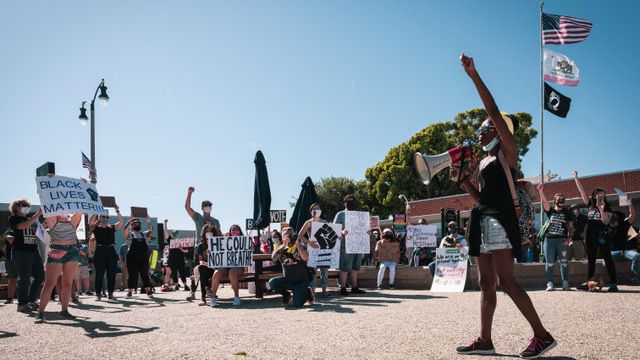Eight days before the premiere of a film sharing the stories of Black residents in the city of El Segundo, a terrorist threat was sent to the event's producers: stop the screening, or your event will be bombed.
The producers behind "Black in Mayberry" — a reference to the town's idyllic "Mayberry-by-the-Sea" nickname — weren't cowed, and many as 40 people joined an impromptu march down El Segundo's Main Street to the film's premiere.
"It's not about the threat, but the response," said Avery Smith, a 20-year El Segundo resident.
According to police, the threat emailed to staff at the El Segundo Museum of Art promised to "firebomb the event if they continue to spread the BLM movement." As a result, police engaged local and federal law enforcement to step up security and assist in the investigation.
Local officials quickly decried the threat of violence, and El Segundo police called in support from South Bay law enforcement to provide bomb detection assistance at the premiere.
The hour-long film tells 12 stories of Blackness in an overwhelmingly homogenous city (according to a 2019 U.S. Census Bureau estimate, nearly 72% of El Segundo residents are white; less than 4% of residents are Black).
"I wasn't surprised that we had some kind of threat…and I wasn't intimidated, because I feel a lot of the times people do this is because they want to stop your actions," said Tanya Taylor, the film's producer.
Taylor is a founding member of El Segundo for Black Lives. The group formed in 2020 in response to the murder of George Floyd by a Minneapolis police officer last May, and Taylor helped organize events, protests and marches. She's seen quite a few threats.
"It's usually a way for them to disrupt or disturb your activities, and I felt there was no way they're going to silence these voices," Taylor said.
"Black in Mayberry" is a relatively simple film: Throughout 2020, 14 Black El Segundo residents were interviewed to tell the stories of challenges and fears they faced in the city they call home. Their stories are told in first-person, looking directly into the camera, which is shot in black and white.
"It's an American story, told through the lens of El Segundo. That lens makes it a lot more accessible," said director Mark Knight. "Frankly, engaging with America is hard. But engaging with Denise from down the block? You can do that."
The film's spare style forces the audience to look directly into the eyes of its storytellers and absorb their words.
One woman describes her routine to look as non-threatening as possible when exercising outside; another tells a story of a prospective employer who asked her to use her less-ethnic middle name as a condition of hiring; a non-binary teenager explained the challenges of being Black on top of existing along the spectrum of gender identities and sexualities.
The commonality is that they each have been prone to prejudice strictly owing to the bodies they were born into.
"Black people in El Segundo live on the outskirts, trying to be as un-Black as possible to get by," Taylor said. She found that understanding of the protests was only skin-deep — that police brutality is important, but only a part of the weights carried by Black Americans. This film, she felt, was an opportunity to bring that out, share the Black experience, and open a dialogue among the city's residents.
And to bind the segments, Taylor and Knight used the opening theme song of "The Andy Griffith Show," a jaunty whistling tune. It played off the title and the city's identity. Still, Taylor found one more connection: that carefree whistling is a luxury that people of color might not have in a world where they have to consider their safety with every move.
The film was made in partnership with the El Segundo Museum of Art, where Knight had essentially free rein to film interviews in a studio space. The experience of filming during the pandemic lent itself to create an especially vulnerable and intimate atmosphere for the interviews. One of the film's cast members even brought his son to the shoot, essentially telling the story directly to him as he sat beside the camera.
The film's premiere was a great success, Knight said, despite the threat. "We could not have had a better night," he said. "The feedback we got from people has been tremendous, and from a very diverse cross-section of people who were there."
"I think so many people responded so positively to it because they really wanted to see change in their community," Taylor said. "We all hope that it creates a bridge, or at least a platform, for more discussion in a non-confrontational way."
"Black in Mayberry" is streaming for free at esmoa.org now through 7:30 p.m. on May 15, with future releases to be determined. For more information, visit esmoa.org or blackinmayberry.com.
